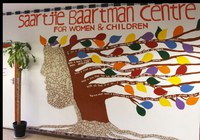Return Minimum Wage Bill to Parliament, CGE demands
The CGE in a letter to President Cyril Ramaphosa ministers of social development (Susan Shabangu) and Labour (Mildred Oliphant) requested a meeting to discuss the concerns the NPO sector raised in a complaint lodged with the CGE earlier this month. CGE Chairperson Lulama Nare in the letter also requested Ramaphosa to intervene and send the bill back to Parliament for further consultation and consideration. Nare said careworkers who are mostly women, “remain invisible because South Africa has not substantially reviewed the burden of unpaid care work on women, more glaringly so in the NMW Bill dispensation”. She labelled the exclusion of care workers from the protections enjoyed by other workers in the bill as discriminatory.
Care Work Project Manager at the Shukumisa Coalition Lisa Vetten told ParlyBeat the NPO sector is “highly feminised” with about 70% of the sector being female. “Once you focus on the care workers specifically, the percentage is even higher. We have a whole sector that can just be left out, which defeats the purpose of the bill,” Vetten explained. “It is very much also a gender equality issue.” Vetten said many NPOs have limited resources and departmental funding is often inadequate to cover all operational expenses. “These NPOs are already struggling and many will have to close their doors if they cannot pay staff.” Vetten also highlighted these challenges in a recently launched report analysing the costs of running shelters in South Africa. She authored it in partnership with the Hlanganisa Institute for Development South Africa (HiDSA), the National Shelter Movement of South Africa and the Heinrich Boll Stiftung Southern Africa. Shukumisa, a coalition of over 1 500 non-profit organisations providing rape and domestic violence-related care to women and children as well as other social services, recently laid a formal complaint at the CGE which prompted the Commission to intervene.
Back in Parliament this week, the concerns over NPO funding and the impact of the bill came up during oral question time for the first time since the bill was passed in August. Thus far neither Parliament nor the Department of Social Development has done much publicly to allay fears of the NPO care-worker sector. Some MPs in the Portfolio Committee on Social Development who spoke to ParlyBeat confirmed the committee had not yet scheduled the issue for discussion. Chair of the Select Committee on Economic and Business Development Mandla Rayi told ParlyBeat the matter is “out of [their] hands now” and that the bill allows for exemptions where employers cannot pay the minimum wage. “We agree with these mechanisms. This is a funding issue, not a labour issue. We encourage the NPOs to work with the Department of Social Development towards finding solutions for their funding problems.” He said NPOs should approach their nearest labour offices should they need help with the online application system for exemption.
When ParlyBeat approached the Department of Social Development earlier for comment on how they intend to tackle this, the department passed the buck by referring all questions to the provincial departments of Social Development, and this despite issues around policy being the mandate of the national department. However, on Tuesday, there was nowhere to hide for Shabangu. IFP MP Liezel van der Merwe asked her what she has done since the start of her term to ensure the department’s subsidies enable NPOs to comply with the minimum wage. Van der Merwe said some shelters looking after abused women and children are forced to feed them on R9 a day. In some shelters, staff are paid as little as R600 per month, she said. “This means your subsidies are forcing shelters to violate labour legislation and women and children are not getting the services they deserve.” According to van der Merwe, even those imprisoned for committing a crime are treated better as government can spend up to R350 on a prisoner per day.
Shabangu said the department is aware of these issues. “The department is currently working on a review of the sector and this will also address issues of funding. We will very soon be able to present to Parliament a policy on shelter reform.” Shabangu acknowledged funding to NPOs - especially shelters – is inadequate but reminded MPs of the economic climate and budget constraints. “We are mindful of this and we are working with others in the private sector to see how we can augment this.” She also reminded MPs that the minimum wage is not in effect yet. “It is a process. As soon as it is concluded we will be able to say in what way we are able to comply.”
Social worker and former shelter manager Stephanie Pretorius told Parlybeat only two of the 15 shelters providing services to abused women, family and victim-empowerment services remain open in the Free State. The Serobe Crisis Centre she managed closed earlier due to funding constraints.
“We had capacity for 15 women and their children. Our funding from the department amounted to about R20 000 per month. That was barely enough to provide the service. We had women showing up with their children. When women flee, they flee with everything – from the children to the puppies. This means providing services from security, lease payment, utilities, transport to schools and work and basic things like toiletries. Not having the means to properly provide these services is secondary and institutional victimisation.” Pretorius said it is not just those who they help who suffer, but also those in charge of care. “Inadequate funding of these NPOs are forcing people into servitude. For many of us this is not just a job – it’s our life’s work,” she said.

